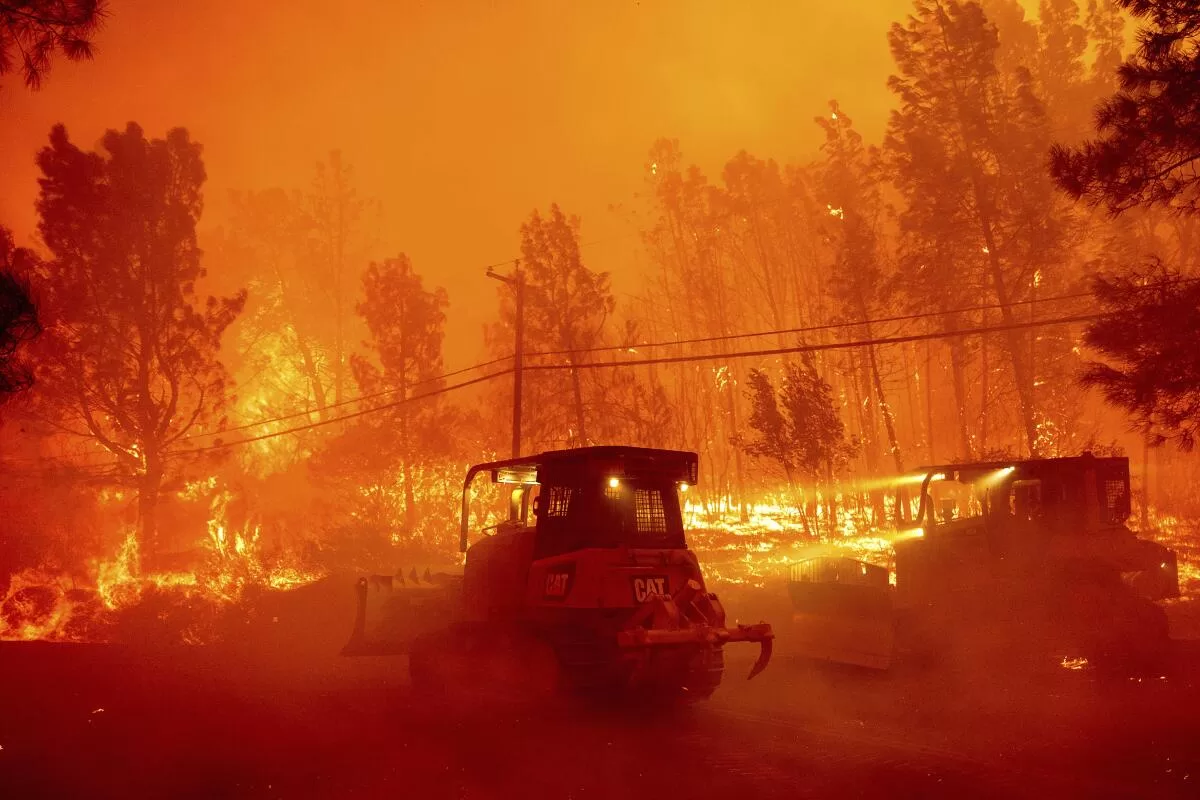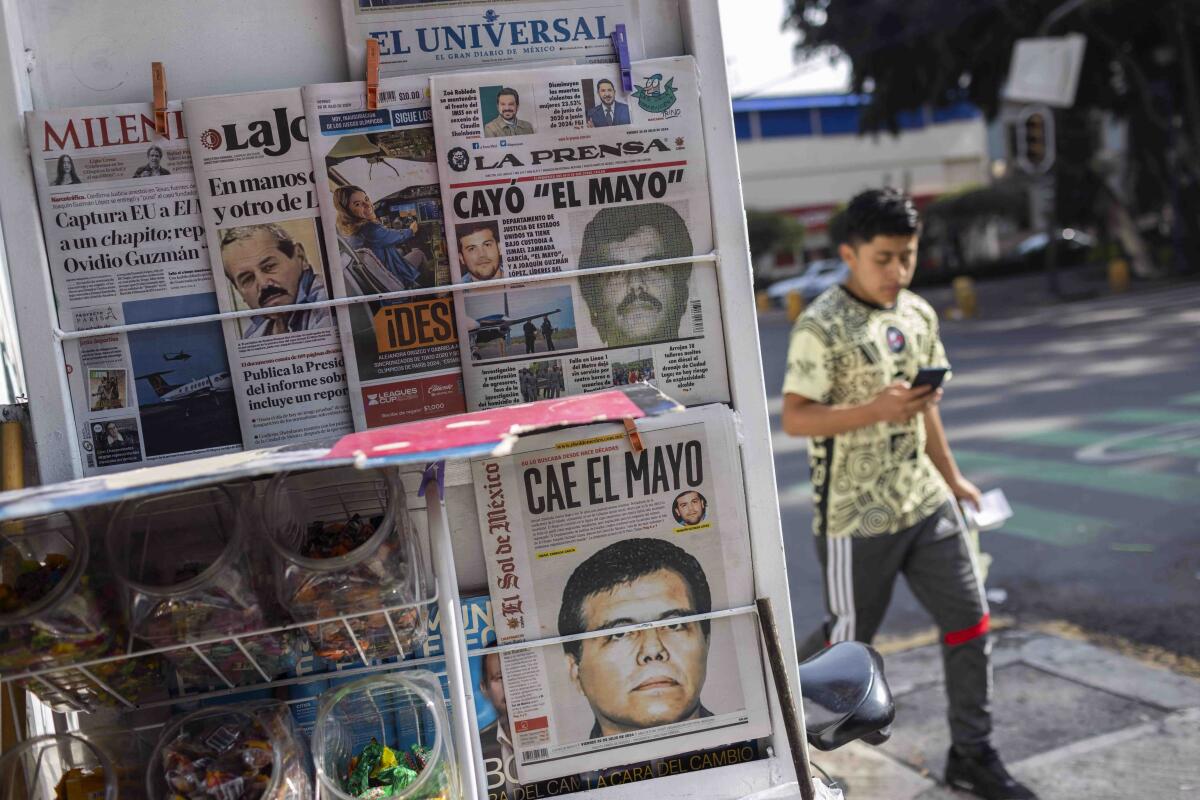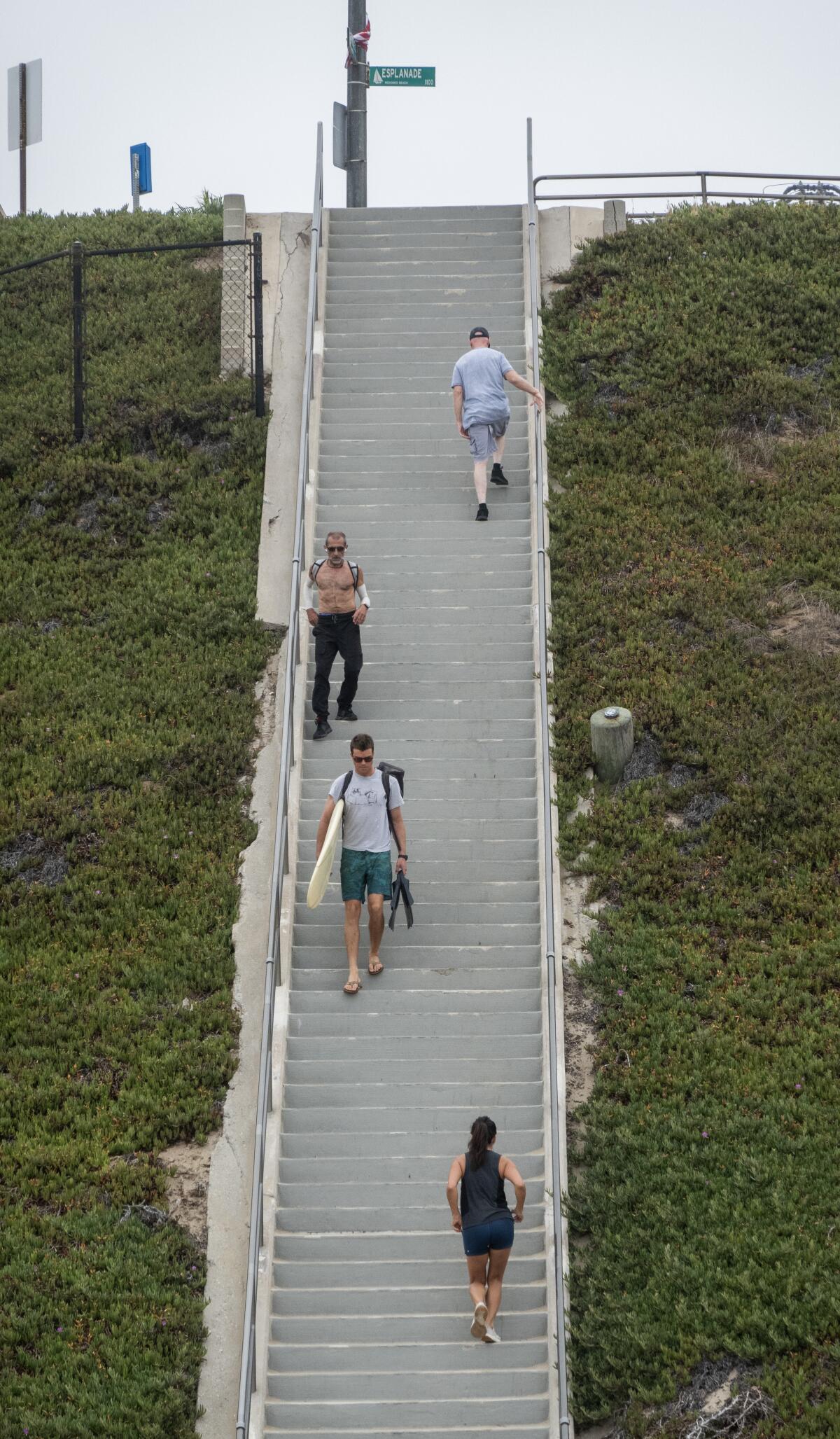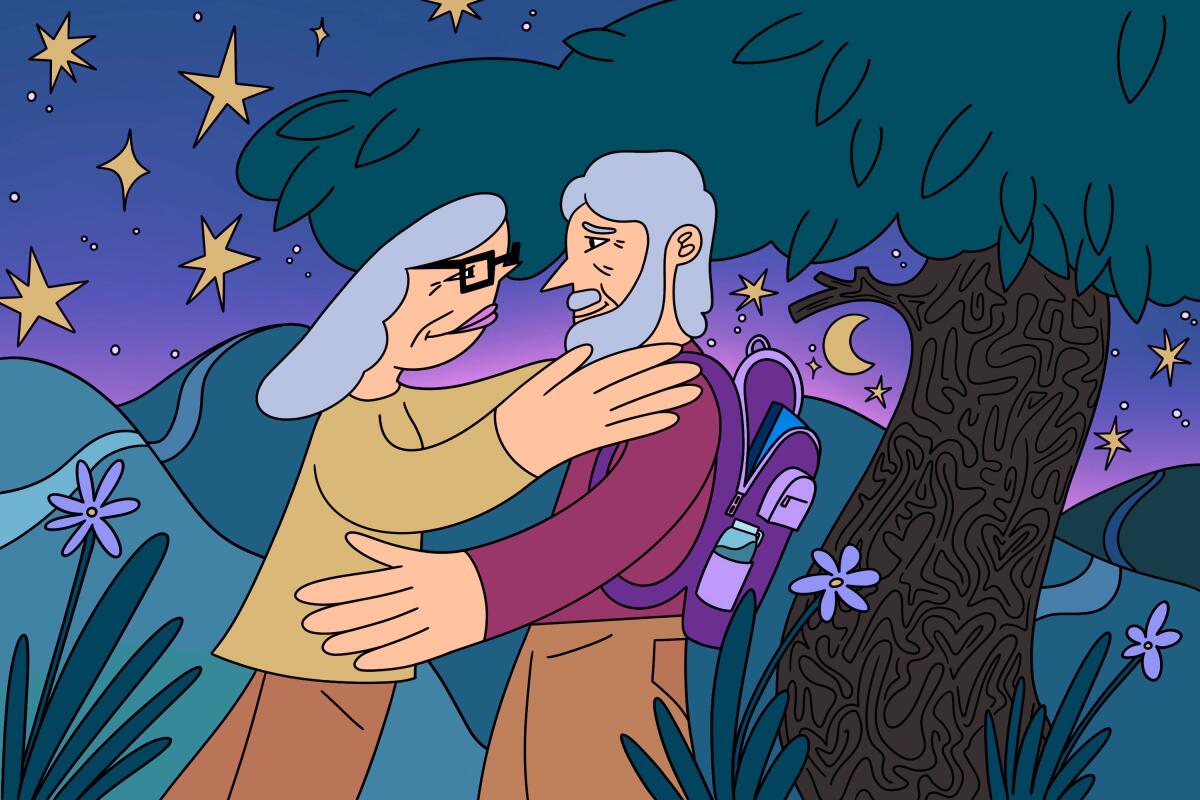Good morning, and welcome to the Essential California newsletter. It’s Sunday, July 28. I’m your host, Andrew J. Campa. Here’s what you need to know to start your weekend:
Newsletter
Sign up for Essential California
The most important California stories and recommendations in your inbox every morning.
You may occasionally receive promotional content from the Los Angeles Times.
California’s largest fire roars with no relief in sight
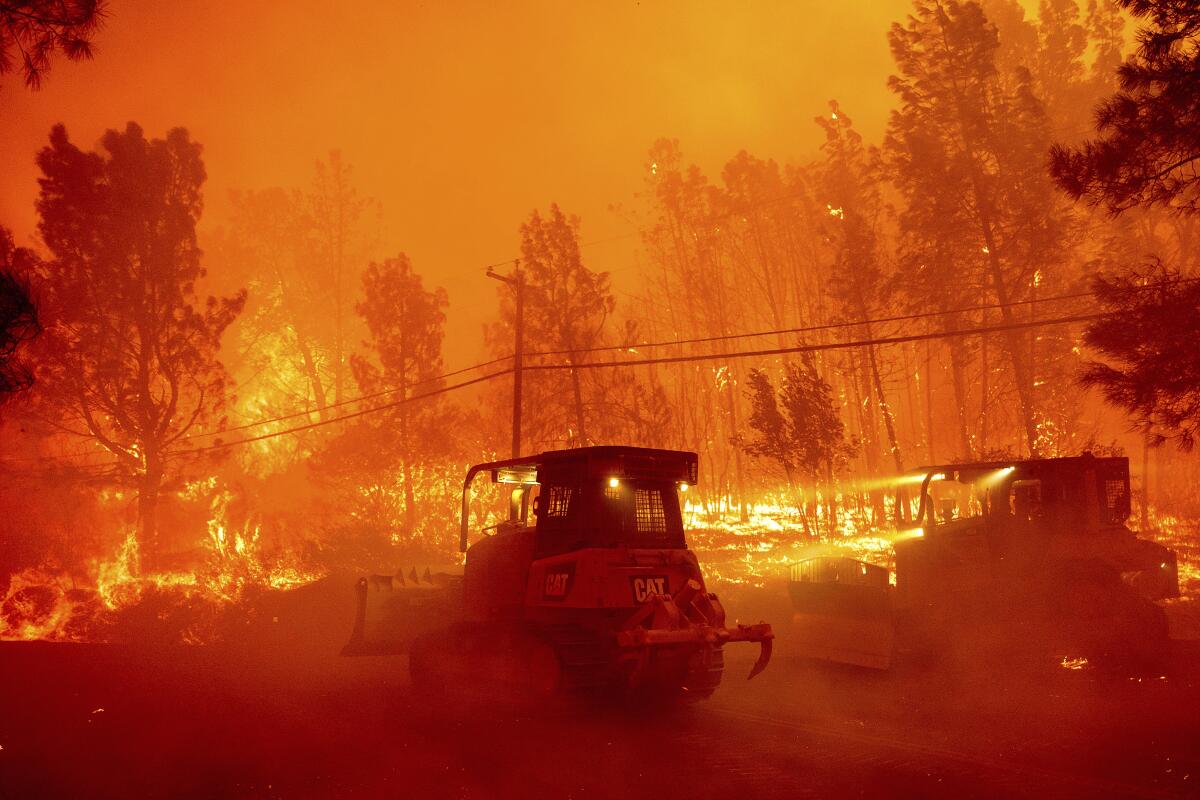
A hillside burns as the Park Fire tears though the Cohasset community in Butte County, Calif., on Thursday, July 25, 2024.
(Noah Berger / Associated Press)
The catalyst behind this year’s largest fire is a burning car that authorities said a Chico man pushed down a 60-foot embankment into a gully last week.
The vehicle — engulfed in flames — ended up in Chico’s Bidwell Park. The fire then quickly spread.
Authorities arrested the suspect, Ronnie Dean Stout II, the next day, Thursday.
Cal Fire reports that the blaze had scorched more than 350,000 acres across Northern California’s Butte and Tehama counties. It’s 10% contained.
The perfect storm of fires
Experts say the fire’s explosive growth is due to a perfect storm of hot, dry conditions, combustible vegetation and a landscape that hasn’t burned in decades. Combine those elements with the fire’s remote terrain, which has made it challenging for crews to gain access to the blaze’s swelling perimeter, and the firefight could be long and arduous.
“This is really the first fire in the past several years in California that I would call extraordinary — and that’s not a good thing,” Daniel Swain, a climate scientist with UCLA, said in a briefing.
On Thursday, footage captured by AlertCalifornia wildfire cameras appeared to show the blaze spewing tornado-like vortices, sometimes referred to as fire whirls or firenados.
“At this point the fire is kind of creating its own weather, and that can be pretty unpredictable,” said Courtney Carpenter, a meteorologist with the National Weather Service in Sacramento. “Really big, explosive wildfires can create thunderstorms; they can make whirling fire plumes that can mimic tornadoes.”
Swain said it is almost certain to become several times larger than it currently is, and will probably be a several-hundred-thousand-acre fire before it is contained.
Path of destruction
The fire’s rapid rate of spread has so far marched it north and east — stretching across northern Butte County and a growing portion of Tehama County — into a relatively remote mixture of grass, brush and timber and away from the threatened communities of Cohasset and Forest Ranch.
The fire, however, has already carved a path of destruction. Chief Garrett Sjolund, of Cal Fire’s Butte County unit, said “numerous structures” have been burned, including 134 buildings destroyed and 4,000 under threat.
Officials are worried about the community of Cohasset, where they initially feared a repeat of the 2018 Camp fire, which razed the nearby community of Paradise and killed 85 people — the deadliest wildfire on record in California. During that blaze, dozens of people were trapped on the area’s limited roadways while trying to escape.
About 4,000 residents have been evacuated from Cohasset, Forest Ranch and parts of northeast Chico, along with several rural areas in southern Tehama County.
The area was under a red flag warning, signaling dangerous weather that supports rapid fire grow, both Thursday and Friday.
That pattern has pushed flames into wilderness that has been untouched by fire for decades, if not longer — making it ripe with thicker vegetation and dead and dying brush, which ignites easily and fast.
Residents from the Chico area are watching the Park fire’s movements with anxiety.
“It’s been a pretty restless time for us,” said Don Hankins, a professor of geography and planning at Chico State, who is also on the Butte County Fire Safe Council.
What’s the outlook?
The days and weeks ahead are likely to see more acreage added to the fire as crews contend with rugged, volcanic topography and persistent hot and dry conditions.
“The outlook is that it’s not going to be easily contained,” Hankins said. “We’ve got a long season ahead of us before the rainy season comes, and that’s really going to be the ultimate thing to curtail any of these fires that are happening across the West right now.”
For more on the fire, please check out the reporting of journalists Hayley Smith and Grace Toohey.
The week’s biggest stories
Olympic Games
Labor and strikes
Election 2024
Homelessness
Environmental news and fires
More big stories
Get unlimited access to the Los Angeles Times. Subscribe here.
Column One
Column One is The Times’ home for narrative and long-form journalism. Here’s a great piece from this week:
Even among Mexican cartel bosses — a bunch known for lavish wealth, daring escapes and extreme brutality — Ismael “El Mayo” Zambada stood out. He was a longtime partner of Joaquín “El Chapo” Guzmán, and together they built the Sinaloa cartel into a global empire. Taking on an almost mythic status, he is rumored to have judges, generals and even presidents of Mexico in his pocket. And despite more than four decades on the run as one of the world’s most wanted fugitives, he had never spent a single night in jail.
More great reads
How can we make this newsletter more useful? Send comments to [email protected].
For your weekend
Going out
Staying in
L.A. Affairs
Get wrapped up in tantalizing stories about dating, relationships and marriage.
At 77, I had given up. After two failed marriages and years of unsuccessful dating, I accepted what seemed to be my fate: single for almost 40 years and single for however many remained. You don’t get it all, I told myself. I was grateful for family, friends and work. Life settled into what felt like order. Until Ty.
Have a great weekend, from the Essential California team
Andrew J. Campa, reporter
Carlos Lozano, news editor
Check our top stories, topics and the latest articles on latimes.com.
